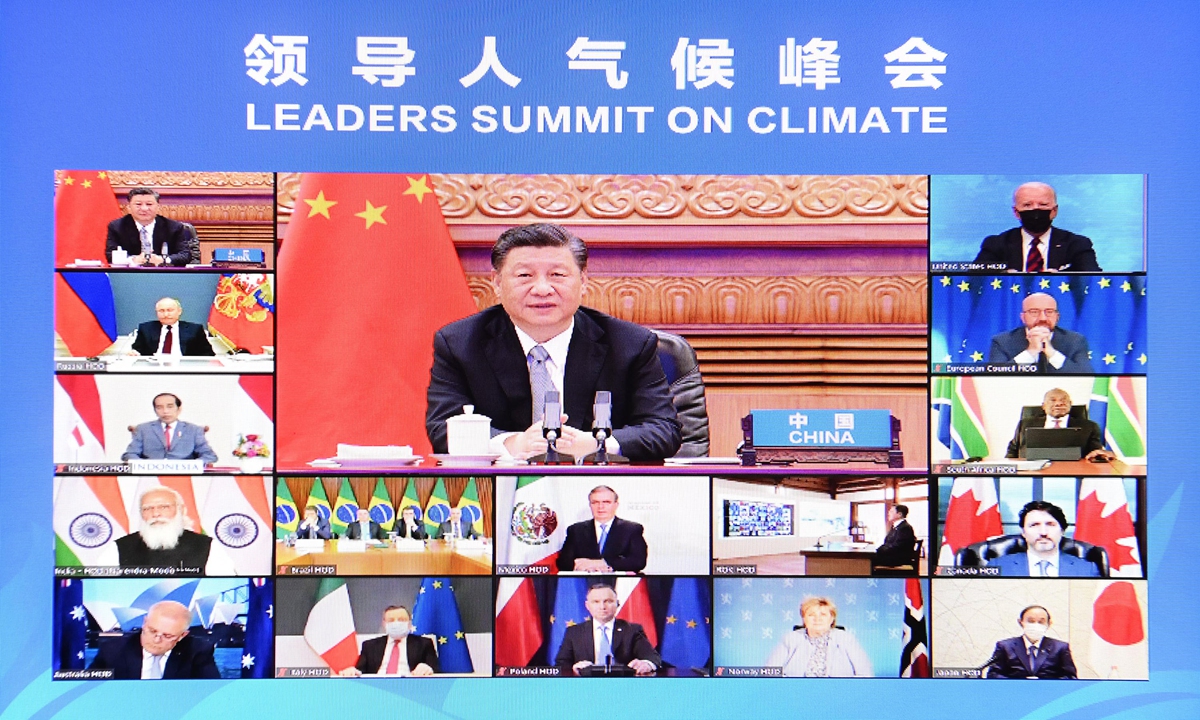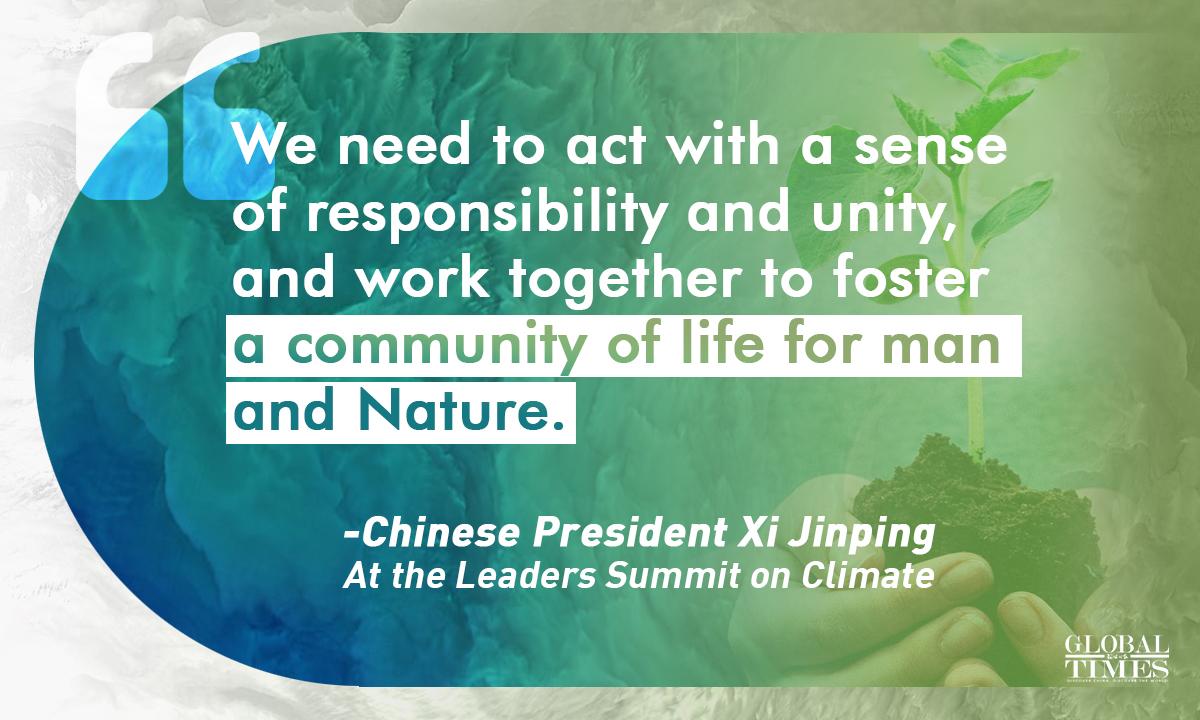https://youtu.be/l_t9VxfewIg

Climate could be ‘competition hot spot’ due to US uncertainty
During a US-led global climate summit in which Washington seeks to shore up global leadership on the issue, Chinese President Xi Jinping reiterated China's goal of reaching carbon neutrality in 2060, a goal that is hailed by analysts as most ambitious in terms of time duration compared with developed countries; and the president's proposal of "jointly building a community for man and nature" was praised by observers as "putting up a new rule for human being's new civilization."
Addressing the summit, Xi said from Beijing via video link that in the face of unprecedented difficulties in global environmental governance, the international community must take unprecedented ambitions and actions, bravely shoulder responsibilities, and work together to build a community for man and nature.
US President Joe Biden pledged in his opening remarks at the summit to cut US greenhouse gas emissions in half by 2030 compared to 2005 levels, a target that would nearly double America's previous commitment when signing the Paris Agreement, which was to reduce its emissions about 28 percent below 2005 levels by 2025.
By inviting leaders of some 40 state leaders to attend the summit and announcing an unbinding yet ambitious goal, Biden eyed a high-profile comeback for the US in the global climate framework, after four years of the Trump administration's unvarnished climate denial landed a heavy blow to international efforts to combat climate change, observers said.
China's ambition, devotion
Xi said at the summit that China welcomes the US coming back to the multilateral governing process on climate issues, and China and the US just issued a joint statement on responding to the climate crisis. He also urged countries to stick to their promises, instead of walking back against their commitment.
Prime Minister Narendra Modi of India made no new commitment. Only US allies, including Canada and Japan, announced their new goal in climate change. Canada vowed to cut its greenhouse emissions by 40 to 45 percent from 2005 levels by 2030, compared with its previous target of a 30 percent emissions reduction in the same time frame.
Some Western media, including the Associated Press, reported previously that Biden's proposal of a new climate goal is to prod countries to further cut their emissions. Yet Chinese climate observers lashed out at such intention, saying that being the country investing the highest in clean energy, China is doing its utmost to curb emissions; and its determination in this area won't be pressured by countries with about-faces on this issue.
Xie Zhenhua, China's special envoy on climate change, said at a press conference held after Xi's speech that although China did not put forward a specific plan for 2030, China's current goal is very ambitious.
The EU's per capita carbon dioxide emissions reached 7.9 tons from 1990 to 1992 when the bloc realized carbon peaking, and the figure was 19.9 tons for the US when its carbon emissions peaked in 2007, said Xie, noting China's carbon dioxide emissions per capita will be 7.2 to 7.5 tons when its emission peaks in 2030, far below that of the US.
He said that China will realize its goals set previously, and is making plans and investments. "China made an ambitious plan and will stick to its word… Its ambition needs not be questioned," said the envoy.
"China would not bring forward new goals, but China will gradually detail its existing goals, such as the coal industry reaching the carbon emissions peak earlier," Li Junfeng, former director general of China's National Center of Climate Change Strategy Research under the National Development and Reform Commission, told the Global Times on Thursday.
China will include carbon emissions peak and carbon neutrality into the country's whole layout of building an eco-civilization, and is working on plans of carbon emissions peak, said Xi.
In the post-industrial era, tackling the climate issue also means changing the way of thinking and the way of production as well as the way of life. It's an ambitious plan for China as the country has to catch up and even exceed other developed countries in reaching the goals that developed countries took many years to reach, Wang Yiwei, director of the institute of international affairs at Renmin University of China, told the Global Times on Thursday.
According to Wang, China would only spend 30 years to reach the carbon emissions peak to carbon neutrality as the largest developing country with the largest population. "China is committed to achieving the goals which will greatly contribute to the global fight against climate change, inspiring more developing countries to make utmost efforts."
During the summit, Xi also put forward a six-point proposal on building a community of life for man and nature. To build such a community, we must be committed to harmony between man and nature, green development, systemic governance, a people-centered approach, multilateralism, and the principle of common but differentiated responsibilities, Xi said.
Xi's proposal of the term sets a new rule for human civilization, and if the biggest developing country can realize such goal, China will galvanize other developing countries to follow suit. By doing this, China is also meant to serve as a bridge between developed and developing countries, which is to infuse the green notion and technology used in developed countries to third world countries.
Cooperation or contest?
By enticing leaders to participate in the summit, the US, which had hindered global climate efforts, aims to shore up leadership in the field and demonstrate its determination by upping the ante of its emissions goal, Yang Fuqiang, a research fellow at Peking University's Research Institute for Energy, told the Global Times on Thursday.
Yet the expert said the US' seemingly ambitious yet unbinding promise is "symbolic." "The US has let its emissions rise unrestrained after its withdrawal from the Paris Agreement. Now, it is setting a target compared with the start point, but who is going to fix the few year's gap left by the US, and why does Washington still believe it has the legitimacy to prod other countries to set an ambitious goal after its flip-flop has diminished global efforts in fighting climate change?"
The US Environmental Protection Agency's February data shows the country's carbon emissions rose during the first three years after former US president Donald Trump decided to pull the US out of the Paris Agreement.
The country's total emissions in 2019 were still 121 MMt above where they were in 2017 when Trump took office, marking the highest level of carbon pollution the US generated in five years.
Unlike China, which has a smooth and efficient system of implementing orders from above, Biden's climate plan is facing a filibuster dilemma, mostly from Republicans who oppose his plan, and will eventually cripple the US president's plan of pushing forward his clean energy project, Li said.
The US also targeted the China-proposed Belt and Road Initiative (BRI), trying to throw mud at China's efforts in tackling global warming. While campaigning for the US presidency, Biden criticized China for financing dirty fossil fuel projects around the world through the BRI - and essentially "outsourcing" Chinese carbon pollution to other countries.
"Developing countries in the BRI prioritize boosting the economy, which results in large amounts of carbon emissions. But without the help from China's technology and capital, the emissions will be larger than the current level," said Yang.
Xi also vowed at the summit to prioritize ecological civilization into the BRI. China has launched a green action proposal and is taking green infrastructure, energy, transportation, finance and a slew of other green measures to benefit people of BRI countries.
China has worked together with BRI countries to elevate their ability to cope with climate change, and has build low-carbon demonstration areas with countries such as Cambodia and Laos.
In contrast, the US has invested large amounts of money to support overseas fossil fuel projects. US public finance for overseas fossil fuel projects averaged more than $4 billion annually over the past decade, at times exceeding $10 billion in a single year, according to Washington-based Oil Change International, an advocacy group opposing fossil fuels.
Some Western media and organizations also pressured China to further eliminate emissions, saying China's energy-related carbon emissions accounted for about 28.8 percent, while the US accounted for 14 percent.
Yang called such comparison "oversimplified." "We have to take into account historical emissions since the industrial revolution; countries' carbon dioxide emissions per capita and talk of realizing peak carbon emissions," Yang said.
The US has emitted more carbon dioxide than any other country to date: at around 400 billion tons since 1751, it is responsible for 25 percent of the historical emissions; that is twice more than China, according to data portal Our World in Data.
From realizing peak carbon emissions to carbon neutrality, it will take China 30 years, but the US would take 43 years for the same goal. Developed countries had caused the bulk of the historical accumulation of carbon dioxide in the atmosphere.
Climate change has been the hot spot for countries to underscore global governance, as well as to showcase national image. It's not a bad thing that the US seeks to undertake leadership, yet its about-faces have left severe consequences, Yuan Zheng, deputy director and senior fellow of the Institute of American Studies at the Chinese Academy of Social Sciences, told the Global Times on Thursday. He noted that the US government hopes to use the climate issue to serve its own strategic goals, but it would be very hard for it to completely lead other countries of great influence, including China, France and Germany.
The US is "walking against the deal at will, and wants to lead others when it's back." This has deeply hurt other countries. A mere summit is impossible to fix its image, according to Yuan.
Li Haidong, from the China Foreign Affairs University, pointed out that US climate policy lacks continuity. Biden's policy is likely to be thwarted by Republicans when the latter takes office. "It is difficult for the climate issue to be the long-term glue of China-US cooperation."
He said that as the US eyes climate issues to shoulder global leadership, the topic may become a target of strategic competition between the US with China and Russia. "So in the long run, the climate issue may be the hot spot for China-US competition."
Related posts:
'Forced labor’ lies and plots target solar energy industry

中美高层战略对话在即 美不行待客之道 中方严正回应! 20210319 |《今日关注》CCTV中文国际 中国核心利益没有退让余地 中美需避免零和博弈管控分歧 20210320 |《今日关注》CCTV中文国际
Chinese diplomats state China's position in the opening remarks of the China-US high-level strategic dialogue in Anchorage, Alaska, on T.
People march in downtown Montreal, Canada during a demonstration against anti-Asian racism on March 21, 2021







No comments:
Post a Comment